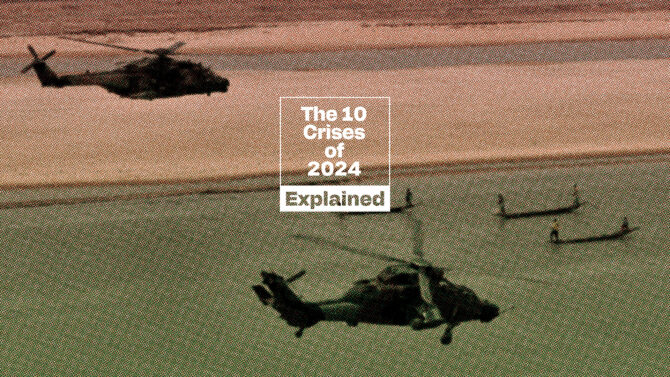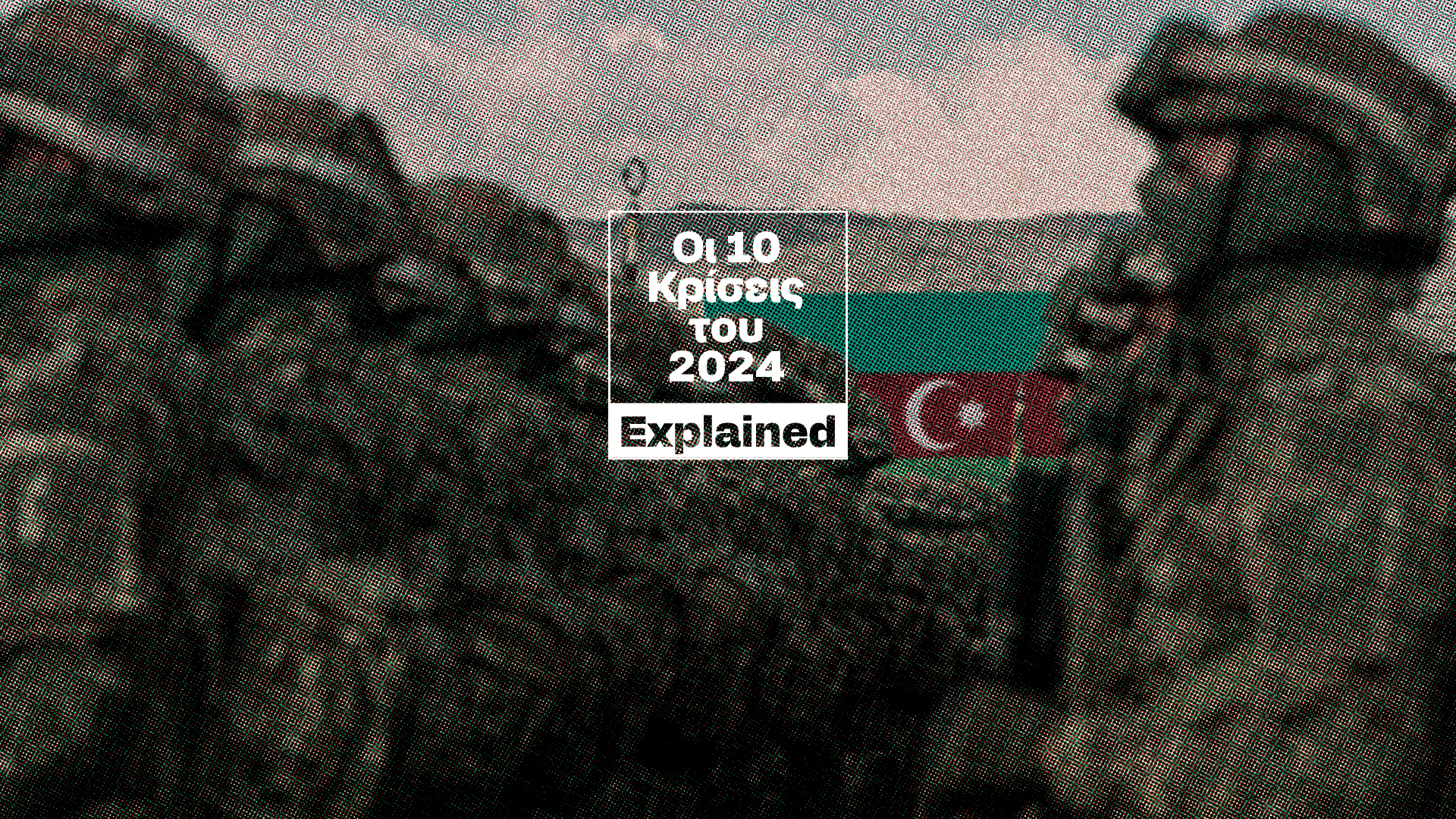Following the recent clashes in September 2023, the situation in Nagorno-Karabakh, the region in the South Caucasus that has been the focal point of the Armenia-Azerbaijan conflict since 1988, appears to be stabilising. In the seventh installment of the series “10 Crises of 2024,” iMEdD discusses with Dr. Anna Matveeva, a senior visiting research fellow at Russia Institute, King’s College London, about the crisis in Nagorno-Karabakh. What are its history and causes, what is the situation today, and most importantly: are Armenia and Azerbaijan heading for another conflict?
6. Sahel: Geopolitical chess in the southern tip of the Sahara

The 10 crises of 2024 – Explained: 6. Sahel: Geopolitical chess in the southern tip of the Sahara
Where is Nagorno-Karabakh?
Nagorno-Karabakh (also known as Artsakh) spans a mountainous terrain covering 3,170 square kilometres. Nestled amidst the South Caucasus Mountains between the Kyrus and Araxi rivers, it officially falls within Azerbaijan’s borders, despite being predominantly inhabited by Armenians until recently. For over three decades, it has remained the focal point of the enduring conflict between Armenia and Azerbaijan.

What is the region’s history?
Since 1806, the region was under the dominion of the Russian Empire, later becoming part of the Soviet Union (USSR). In 1923, during the Soviet era, the autonomous region of Nagorno-Karabakh was established within Soviet Azerbaijan, comprising a mixed Armenian and Azerbaijani population. During the dissolution of the Soviet Union, the region experienced escalated tensions. In 1988, the First Nagorno-Karabakh War erupted between Armenia and Azerbaijan, lasting until 1994 and resulting in approximately 30,000 casualties. Armenia emerged victorious, gaining control over Nagorno-Karabakh and additional Azerbaijani territories. This resulted in demographic changes, with the Muslim Azerbaijani population leaving the area and being replaced by Christian Armenians. An estimated one million individuals were displaced from the region to Azerbaijan, the majority of which belonged to the Azeri population. In 1991, the Republic of Nagorno-Karabakh established itself as a de facto state with its own government, but received no recognition from any foreign country, not even Armenia, and the region remained internationally recognised as part of Azerbaijan.
In the ensuing period, and up until 2020, the situation remained relatively stable, characterised by sporadic minor conflicts, often referred to as a “frozen conflict.” However, tensions soared in September 2020, culminating in the Second Nagorno-Karabakh War. Over the course of 44 days of hostilities, more than 6,500 people were killed. Azerbaijan successfully reclaimed its lost territories and gained control over parts of the Nagorno-Karabakh region. Under the auspices of Russia, the two countries subsequently signed a ceasefire, which included the deployment of 2,000 Russian soldiers as a peacekeeping force tasked with safeguarding the Lachin Corridor, a mountainous route in western Azerbaijan that serves as the sole connection between Nagorno-Karabakh and Armenia. This corridor has been a focal point of recent tensions in the region.
What is the current situation?
In December 2022, Baku imposed a total blockade of the Lachin Corridor, halting the supply of vital goods to the Armenian population residing in the Nagorno-Karabakh region. This development escalated into a humanitarian crisis, exacerbating shortages of essentials such as food and medicine, prompting Luis Moreno Ocampo, former Prosecutor of the International Criminal Court, to say: “There is a reasonable basis to believe that a genocide is being committed.” Meanwhile, Azerbaijan accused Armenia of utilising the corridor for the transportation of military materials to Nagorno-Karabakh and claimed to have offered humanitarian aid to the region, which was declined by the residents.
From the Azerbaijani perspective, a historical injustice was rectified. From the Armenian perspective, a great injustice has occurred. Nevertheless, the issue of territorial sovereignty has now been definitively resolved
Dr. Anna Matveeva, Senior Visiting Research Fellow at Russia Institute, King’s College London
On September 19, 2023, Azerbaijan launched a one-day offensive, seizing control of the Nagorno-Karabakh region, leading to the dissolution of the autonomous republic. Baku’s conquest resulted in the displacement of tens of thousands of Armenians, with the majority fleeing to Armenia. Armenian authorities reported that over half of the approximately 120,000 Armenians in the region were forced to leave. In response, Azerbaijan asserted its intention to integrate the region and its inhabitants as equals, rejecting accusations of ethnic cleansing.
Dr. Anna Matveeva, senior visiting research fellow at Russia Institute, King’s College London, highlighted in an interview with iMEdD that the 2023 conflict fundamentally altered the regional landscape. “From the Azerbaijani perspective, a historical injustice was rectified. From the Armenian perspective, a great injustice has occurred. Nevertheless, the issue of territorial sovereignty has now been definitively resolved.”
Which foreign powers are involved in the conflict?
The two main foreign powers involved in the conflict are Russia and Turkey. While Russia is officially allied with Armenia, its peacekeeping forces have not effectively protected the Armenian population in the region. Additionally, Moscow maintains close ties with Azerbaijan, which seem to be strengthening. Dr. Matveeva pointed out to iMEdD that Putin now regards Azerbaijan as a more significant ally in the Caucasus compared to Armenia.
Turkey, on the other hand, is a close ally historically and culturally linked to Azerbaijan, supplying it with drones and military equipment during the conflict.
But it’s not just Russia and Turkey. As Dr. Anna Matveeva told iMEdD, Iran, Israel, and the European Union also play significant roles in the region. Iran is an ally of Armenia, with relations spanning various sectors like tourism. On the other hand, Azerbaijan acquires arms and military equipment from Israel and, according to Dr. Matveeva, is the only Muslim country not to condemn the events in Gaza. When discussing the peculiar nature of these alliances—that is, Iran’s affiliation with Christian Armenia and Israel’s with Muslim Azerbaijan—Dr. Matveeva remarked, “Pragmatic considerations far outweigh any religious, historical, existential, and abstract considerations.”
The EU also plays a significant role in the region. On one hand, the distancing of Yerevan from Moscow seems to have strengthened ties between Armenia and the EU, as well as the US, particularly regarding security matters. On the other hand, Azerbaijan serves as a major supplier of natural gas to the EU, a crucial resource given the ongoing conflict in Ukraine. In fact, Ursula von der Leyen has described Azerbaijan as a “reliable, trustworthy partner.”
What will the next day bring?
According to Dr. Anna Matveeva, the most recent conflict in September 2023 “created conditions for the normalisation of relations between the two countries (Armenia and Azerbaijan).” Despite its relatively small scope, the Nagorno-Karabakh conflict involves regional and international stakeholders. Dr. Matveeva adds that the Nagorno-Karabakh conflict “could certainly reshape alliances in the region. Presently, it appears that Azerbaijan emerges as the victor and becomes more valuable for international players like the EU. The response from Armenia remains uncertain, potentially leaving the country in a precarious position with limited regional allies. And, of course, having Iran as the only friend is not sufficient.”
I don’t see any chances of violence escalating because I think people are tired of instability and respond to it with migration rather than war
Dr. Anna Matveeva, Senior Visiting Research Fellow at Russia Institute, King’s College London
Yet Dr. Matveeva’s remains optimistic about the future: “I don’t see any chances of violence escalating because I think people are tired of instability and respond to it with migration rather than war. The time when people were willing to sacrifice their lives for historically disputed territories, in my opinion, has passed, at least for now,” she concludes.
Read all the Explainer texts of the series “The 10 Crises of 2024” here.
